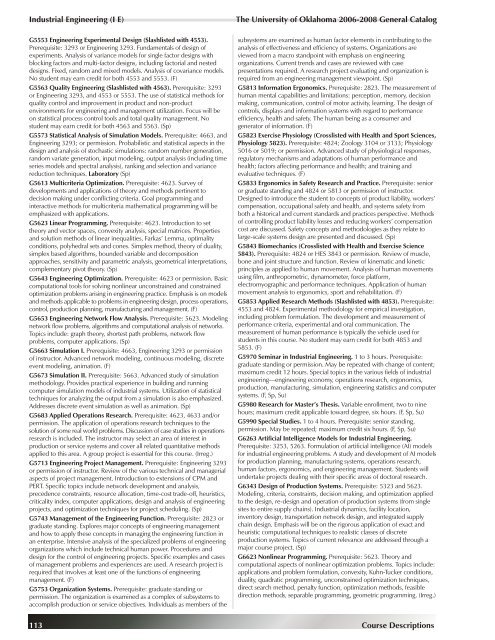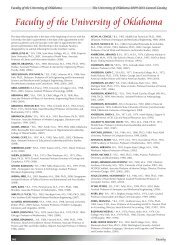2006-08 Course Descriptions - Catalog - University of Oklahoma
2006-08 Course Descriptions - Catalog - University of Oklahoma
2006-08 Course Descriptions - Catalog - University of Oklahoma
Create successful ePaper yourself
Turn your PDF publications into a flip-book with our unique Google optimized e-Paper software.
Industrial Engineering (I E)The Uni ver sity <strong>of</strong> <strong>Oklahoma</strong> <strong>2006</strong>-20<strong>08</strong> Gen eral Cat a logG5553 Engineering Experimental Design (Slashlisted with 4553).Prerequisite: 3293 or Engineering 3293. Fundamentals <strong>of</strong> design <strong>of</strong>experiments. Analysis <strong>of</strong> variance models for single factor designs withblocking factors and multi-factor designs, including factorial and nesteddesigns. Fixed, random and mixed models. Analysis <strong>of</strong> covariance models.No student may earn credit for both 4553 and 5553. (F)G5563 Quality Engineering (Slashlisted with 4563). Prerequisite: 3293or Engineering 3293, and 4553 or 5553. The use <strong>of</strong> statistical methods forquality control and improvement in product and non-productenvironments for engineering and management utilization. Focus will beon statistical process control tools and total quality management. Nostudent may earn credit for both 4563 and 5563. (Sp)G5573 Statistical Analysis <strong>of</strong> Simulation Models. Prerequisite: 4663, andEngineering 3293; or permission. Probabilistic and statistical aspects in thedesign and analysis <strong>of</strong> stochastic simulations: random number generation,random variate generation, input modeling, output analysis (including timeseries models and spectral analysis), ranking and selection and variancereduction techniques. Laboratory (Sp)G5613 Multicriteria Optimization. Prerequisite: 4623. Survey <strong>of</strong>developments and applications <strong>of</strong> theory and methods pertinent todecision making under conflicting criteria. Goal programming andinteractive methods for multicriteria mathematical programming will beemphasized with applications.G5623 Linear Programming. Prerequisite: 4623. Introduction to settheory and vector spaces, convexity analysis, special matrices. Propertiesand solution methods <strong>of</strong> linear inequalities, Farkas’ Lemma, optimalityconditions, polyhedral sets and cones. Simplex method, theory <strong>of</strong> duality,simplex based algorithms, bounded variable and decompositionapproaches, sensitivity and parametric analysis, geometrical interpretations,complementary pivot theory. (Sp)G5643 Engineering Optimization. Prerequisite: 4623 or permission. Basiccomputational tools for solving nonlinear unconstrained and constrainedoptimization problems arising in engineering practice. Emphasis is on modelsand methods applicable to problems in engineering design, process operations,control, production planning, manufacturing and management. (F)G5653 Engineering Network Flow Analysis. Prerequisite: 5623. Modelingnetwork flow problems, algorithms and computational analysis <strong>of</strong> networks.Topics include: graph theory, shortest path problems, network flowproblems, computer applications. (Sp)G5663 Simulation I. Prerequisite: 4663, Engineering 3293 or permission<strong>of</strong> instructor. Advanced network modeling, continuous modeling, discreteevent modeling, animation. (F)G5673 Simulation II. Prerequisite: 5663. Advanced study <strong>of</strong> simulationmethodology. Provides practical experience in building and runningcomputer simulation models <strong>of</strong> industrial systems. Utilization <strong>of</strong> statisticaltechniques for analyzing the output from a simulation is also emphasized.Addresses discrete event simulation as well as animation. (Sp)G5683 Applied Operations Research. Prerequisite: 4623, 4633 and/orpermission. The application <strong>of</strong> operations research techniques to thesolution <strong>of</strong> some real world problems. Discussion <strong>of</strong> case studies in operationsresearch is included. The instructor may select an area <strong>of</strong> interest inproduction or service systems and cover all related quantitative methodsapplied to this area. A group project is essential for this course. (Irreg.)G5713 Engineering Project Management. Prerequisite: Engineering 3293or permission <strong>of</strong> instructor. Review <strong>of</strong> the various technical and managerialaspects <strong>of</strong> project management. Introduction to extensions <strong>of</strong> CPM andPERT. Specific topics include network development and analysis,precedence constraints, resource allocation, time-cost trade-<strong>of</strong>f, heuristics,criticality index, computer applications, design and analysis <strong>of</strong> engineeringprojects, and optimization techniques for project scheduling. (Sp)G5743 Management <strong>of</strong> the Engineering Function. Prerequisite: 2823 orgraduate standing. Explores major concepts <strong>of</strong> engineering managementand how to apply these concepts in managing the engineering function inan enterprise. Intensive analysis <strong>of</strong> the specialized problems <strong>of</strong> engineeringorganizations which include technical human power. Procedures anddesign for the control <strong>of</strong> engineering projects. Specific examples and cases<strong>of</strong> management problems and experiences are used. A research project isrequired that involves at least one <strong>of</strong> the functions <strong>of</strong> engineeringmanagement. (F)G5753 Organization Systems. Prerequisite: graduate standing orpermission. The organization is examined as a complex <strong>of</strong> subsystems toaccomplish production or service objectives. Individuals as members <strong>of</strong> thesubsystems are examined as human factor elements in contributing to theanalysis <strong>of</strong> effectiveness and efficiency <strong>of</strong> systems. Organizations areviewed from a macro standpoint with emphasis on engineeringorganizations. Current trends and cases are reviewed with casepresentations required. A research project evaluating and organization isrequired from an engineering management viewpoint. (Sp)G5813 Information Ergonomics. Prerequisite: 2823. The measurement <strong>of</strong>human mental capabilities and limitations: perception, memory, decisionmaking, communication, control <strong>of</strong> motor activity, learning. The design <strong>of</strong>controls, displays and information systems with regard to performanceefficiency, health and safety. The human being as a consumer andgenerator <strong>of</strong> information. (F)G5823 Exercise Physiology (Crosslisted with Health and Sport Sciences,Physiology 5823). Prerequisite: 4824; Zoology 3104 or 3133; Physiology5016 or 5019; or permission. Advanced study <strong>of</strong> physiological responses,regulatory mechanisms and adaptations <strong>of</strong> human performance andhealth; factors affecting performance and health; and training andevaluative techniques. (F)G5833 Ergonomics in Safety Research and Practice. Prerequisite: senioror graduate standing and 4824 or 5813 or permission <strong>of</strong> instructor.Designed to introduce the student to concepts <strong>of</strong> product liability, workers’compensation, occupational safety and health, and systems safety fromboth a historical and current standards and practices perspective. Methods<strong>of</strong> controlling product liability losses and reducing workers’ compensationcost are discussed. Safety concepts and methodologies as they relate tolarge-scale systems design are presented and discussed. (Sp)G5843 Biomechanics (Crosslisted with Health and Exercise Science5843). Prerequisite: 4824 or HES 3843 or permission. Review <strong>of</strong> muscle,bone and joint structure and function. Review <strong>of</strong> kinematic and kineticprinciples as applied to human movement. Analysis <strong>of</strong> human movementsusing film, anthropometric, dynamometer, force platform,electromyographic and performance techniques. Application <strong>of</strong> humanmovement analysis to ergonomics, sport and rehabilitation. (F)G5853 Applied Research Methods (Slashlisted with 4853). Prerequisite:4553 and 4824. Experimental methodology for empirical investigation,including problem formulation. The development and measurement <strong>of</strong>performance criteria, experimental and oral communication. Themeasurement <strong>of</strong> human performance is typically the vehicle used forstudents in this course. No student may earn credit for both 4853 and5853. (F)G5970 Seminar in Industrial Engineering. 1 to 3 hours. Prerequisite:graduate standing or permission. May be repeated with change <strong>of</strong> content;maximum credit 12 hours. Special topics in the various fields <strong>of</strong> industrialengineering––engineering economy, operations research, ergonomics,production, manufacturing, simulation, engineering statistics and computersystems. (F, Sp, Su)G5980 Research for Master’s Thesis. Variable enrollment, two to ninehours; maximum credit applicable toward degree, six hours. (F, Sp, Su)G5990 Special Studies. 1 to 4 hours. Prerequisite: senior standing,permission. May be repeated; maximum credit six hours. (F, Sp, Su)G6263 Artificial Intelligence Models for Industrial Engineering.Prerequisite: 3253, 5263. Formulation <strong>of</strong> artificial intelligence (AI) modelsfor industrial engineering problems. A study and development <strong>of</strong> AI modelsfor production planning, manufacturing systems, operations research,human factors, ergonomics, and engineering management. Students willundertake projects dealing with their specific areas <strong>of</strong> doctoral research.G6343 Design <strong>of</strong> Production Systems. Prerequisite: 5323 and 5623.Modeling, criteria, constraints, decision making, and optimization appliedto the design, re-design and operation <strong>of</strong> production systems (from singlesites to entire supply chains). Industrial dynamics, facility location,inventory design, transportation network design, and integrated supplychain design. Emphasis will be on the rigorous application <strong>of</strong> exact andheuristic computational techniques to realistic classes <strong>of</strong> discreteproduction systems. Topics <strong>of</strong> current relevance are addressed through amajor course project. (Sp)G6623 Nonlinear Programming. Prerequisite: 5623. Theory andcomputational aspects <strong>of</strong> nonlinear optimization problems. Topics include:applications and problem formulation, convexity, Kuhn-Tucker conditions,duality, quadratic programming, unconstrained optimization techniques,direct search method, penalty function, optimization methods, feasibledirection methods, separable programming, geometric programming. (Irreg.)113 <strong>Course</strong> <strong>Descriptions</strong>








